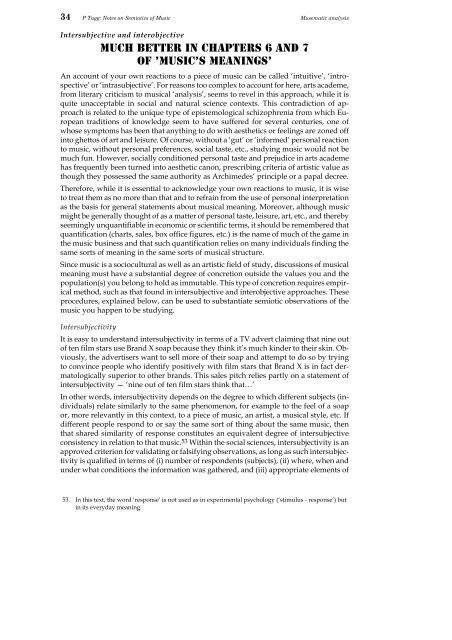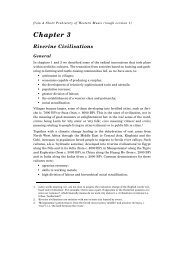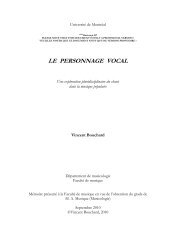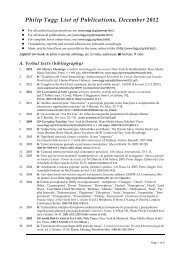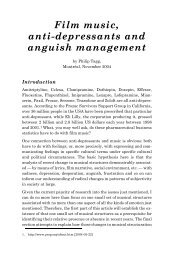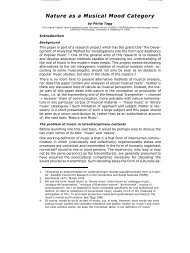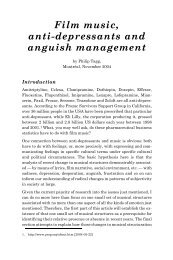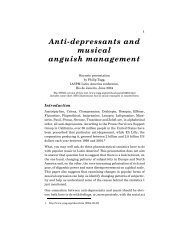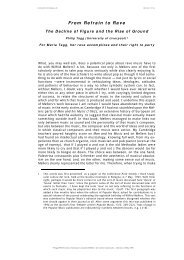Introductory notes to the Semiotics of Music - Philip Tagg's home page
Introductory notes to the Semiotics of Music - Philip Tagg's home page
Introductory notes to the Semiotics of Music - Philip Tagg's home page
You also want an ePaper? Increase the reach of your titles
YUMPU automatically turns print PDFs into web optimized ePapers that Google loves.
34 P Tagg: Notes on <strong>Semiotics</strong> <strong>of</strong> <strong>Music</strong> Musematic analysis<br />
Intersubjective and interobjective<br />
MUCH BETTER IN CHAPTERS 6 AND 7<br />
OF ’<strong>Music</strong>’s Meanings’<br />
An account <strong>of</strong> your own reactions <strong>to</strong> a piece <strong>of</strong> music can be called ‘intuitive’, ‘introspective’<br />
or ‘intrasubjective’. For reasons <strong>to</strong>o complex <strong>to</strong> account for here, arts academe,<br />
from literary criticism <strong>to</strong> musical ‘analysis’, seems <strong>to</strong> revel in this approach, while it is<br />
quite unacceptable in social and natural science contexts. This contradiction <strong>of</strong> approach<br />
is related <strong>to</strong> <strong>the</strong> unique type <strong>of</strong> epistemological schizophrenia from which European<br />
traditions <strong>of</strong> knowledge seem <strong>to</strong> have suffered for several centuries, one <strong>of</strong><br />
whose symp<strong>to</strong>ms has been that anything <strong>to</strong> do with aes<strong>the</strong>tics or feelings are zoned <strong>of</strong>f<br />
in<strong>to</strong> ghet<strong>to</strong>s <strong>of</strong> art and leisure. Of course, without a ‘gut’ or ‘informed’ personal reaction<br />
<strong>to</strong> music, without personal preferences, social taste, etc., studying music would not be<br />
much fun. However, socially conditioned personal taste and prejudice in arts academe<br />
has frequently been turned in<strong>to</strong> aes<strong>the</strong>tic canon, prescribing criteria <strong>of</strong> artistic value as<br />
though <strong>the</strong>y possessed <strong>the</strong> same authority as Archimedes’ principle or a papal decree.<br />
Therefore, while it is essential <strong>to</strong> acknowledge your own reactions <strong>to</strong> music, it is wise<br />
<strong>to</strong> treat <strong>the</strong>m as no more than that and <strong>to</strong> refrain from <strong>the</strong> use <strong>of</strong> personal interpretation<br />
as <strong>the</strong> basis for general statements about musical meaning. Moreover, although music<br />
might be generally thought <strong>of</strong> as a matter <strong>of</strong> personal taste, leisure, art, etc., and <strong>the</strong>reby<br />
seemingly unquantifiable in economic or scientific terms, it should be remembered that<br />
quantification (charts, sales, box <strong>of</strong>fice figures, etc.) is <strong>the</strong> name <strong>of</strong> much <strong>of</strong> <strong>the</strong> game in<br />
<strong>the</strong> music business and that such quantification relies on many individuals finding <strong>the</strong><br />
same sorts <strong>of</strong> meaning in <strong>the</strong> same sorts <strong>of</strong> musical structure.<br />
Since music is a sociocultural as well as an artistic field <strong>of</strong> study, discussions <strong>of</strong> musical<br />
meaning must have a substantial degree <strong>of</strong> concretion outside <strong>the</strong> values you and <strong>the</strong><br />
population(s) you belong <strong>to</strong> hold as immutable. This type <strong>of</strong> concretion requires empirical<br />
method, such as that found in intersubjective and interobjective approaches. These<br />
procedures, explained below, can be used <strong>to</strong> substantiate semiotic observations <strong>of</strong> <strong>the</strong><br />
music you happen <strong>to</strong> be studying.<br />
Intersubjectivity<br />
It is easy <strong>to</strong> understand intersubjectivity in terms <strong>of</strong> a TV advert claiming that nine out<br />
<strong>of</strong> ten film stars use Brand X soap because <strong>the</strong>y think it’s much kinder <strong>to</strong> <strong>the</strong>ir skin. Obviously,<br />
<strong>the</strong> advertisers want <strong>to</strong> sell more <strong>of</strong> <strong>the</strong>ir soap and attempt <strong>to</strong> do so by trying<br />
<strong>to</strong> convince people who identify positively with film stars that Brand X is in fact derma<strong>to</strong>logically<br />
superior <strong>to</strong> o<strong>the</strong>r brands. This sales pitch relies partly on a statement <strong>of</strong><br />
intersubjectivity — ‘nine out <strong>of</strong> ten film stars think that…’<br />
In o<strong>the</strong>r words, intersubjectivity depends on <strong>the</strong> degree <strong>to</strong> which different subjects (individuals)<br />
relate similarly <strong>to</strong> <strong>the</strong> same phenomenon, for example <strong>to</strong> <strong>the</strong> feel <strong>of</strong> a soap<br />
or, more relevantly in this context, <strong>to</strong> a piece <strong>of</strong> music, an artist, a musical style, etc. If<br />
different people respond <strong>to</strong> or say <strong>the</strong> same sort <strong>of</strong> thing about <strong>the</strong> same music, <strong>the</strong>n<br />
that shared similarity <strong>of</strong> response constitutes an equivalent degree <strong>of</strong> intersubjective<br />
consistency in relation <strong>to</strong> that music. 53 Within <strong>the</strong> social sciences, intersubjectivity is an<br />
approved criterion for validating or falsifying observations, as long as such intersubjectivity<br />
is qualified in terms <strong>of</strong> (i) number <strong>of</strong> respondents (subjects), (ii) where, when and<br />
under what conditions <strong>the</strong> information was ga<strong>the</strong>red, and (iii) appropriate elements <strong>of</strong><br />
53. In this text, <strong>the</strong> word ‘response’ is not used as in experimental psychology (‘stimulus - response’) but<br />
in its everyday meaning.


